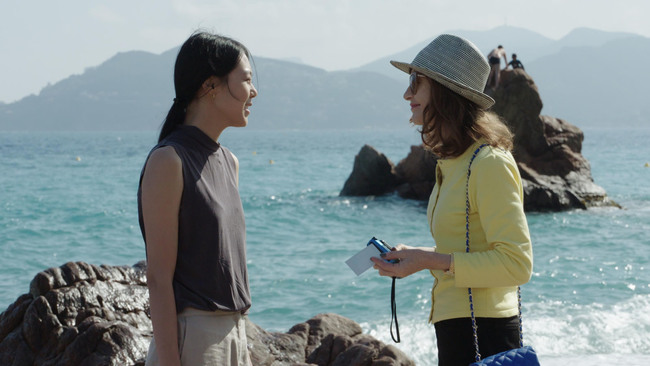Cannes 2017: Hong Sangsoo’s Claire’s Camera

“For ardent Hong Sangsoo fans, 2017 couldn’t be a more rewarding year,” writes Bradley Warren at the Playlist. “Not just because the South Korean filmmaker has three new films ready—the first, On the Beach at Night Alone, launched in Berlin—or even because two of those features are on offer at the Cannes Film Festival, Claire’s Camera and The Day After. No, it’s because a fascinating new frontier has been opened up for this prolific filmmaker: international locations in On the Beach and, even more prominently, Claire’s Camera. Oh, and Isabelle Huppert is back in Hong’s orbit for the first time since 2012’s In Another Country (also the director’s last Cannes Competition entry). Without making too grand a claim before the premiere of other Cannes effort, Claire’s Camera is likely his most re-watchable work since 2014’s Hill of Freedom.”
“Set at the Cannes Film Festival itself, where it was filmed last year, the movie is sketchy, heavily improvised, and bares many markings of a briskly assembled lark,” writes Blake Williams, dispatching to Filmmaker. “The narrative—once again explicitly autobiographical—concerns recently-fired sales agent Manhee (embodied by Hong’s real-life girlfriend Kim Minhee), who was apparently getting too romantically close to Director So Wansoo (Hong doppelganger Jung Jinyoung) for the company head’s comfort. By coincidence, So and Manhee both independently befriend Claire (Isabelle Huppert)—a Parisian teacher and amateur poet/photographer named visiting Cannes for her first time (har har)—which allows for a number of endearingly stilted get-to-know-you sequences.”
“Far from a polished production, Claire’s Camera paradoxically pairs off two acting super stars across several charming awkward, seemingly spontaneously shot conversations,” writes Daniel Kasman in the Notebook. “The two actresses are so charismatic—and Huppert in hat and trench dressed like an amateur detective!—that their stilted attempts to connect and communicate in the shared language of English comes off at once completely true to such random meetings in foreign countries, but is also something quite surreal, if not magical. ‘I agree,’ Claire exclaims at Manhee’s disgust with selling films. ‘It’s great to agree,’ she responds. ‘I agree 100%,’ Claire eagerly affirms.”
The film “could be dismissed as a Rohmer-esque, just-for-fun amusement, which may be enough incentive for Huppert and Hong fans, were it not for a deeper reflection on the purpose of cinema running just below the surface,” suggests Deborah Young in the Hollywood Reporter. “‘The only way to change things is to look at them again very slowly,; pronounces teacher-poet-photographer Claire (Huppert) to her new-found Korean friends. She is clearly Hong’s Prospero, his stand-in as the artist who uses the simplest technical equipment—in Claire’s case, a Polaroid camera—to alter reality.”
“The film itself has all the wispy, gladdening spontaneity of a chance encounter, uncomplicated by grand ideas beyond a few stray musings on the transformative properties of art,” writes Guy Lodge in Variety. “It might be in danger of fluttering off the screen if not for the anchoring charisma of its two stars, both clearly enjoying the chance to mellow out after their recent, more grueling onscreen endeavors.” Those would be, of course, Park Chanwook’s The Handmaiden for Kim and Paul Verhoeven’s Elle for Huppert.
“Hong’s narrative framework, which is often one of the most compelling aspects of his films, again refuses to adhere to a traditional linear structure, forcing the audience to piece the story together,” writes Jason Bechervaise for Screen. “Yet, Claire’s Camera lacks the complexity of some of his finest work and, while awkwardness is synonymous with Hong’s films, weak performances by Chang Mihee and Jung Jinyoung—who both struggle with their English lines—don’t help.”
“In the midst of a strong run of films, Claire’s Camera feels like a perfunctory blip in Hong's catalogue which brings together a formidable troupe of actors and tosses them onto the Croisette, hoping for something to stick, which never quite happens,” finds Pierce Conran at ScreenAnarchy.
Update, 5/26: “Claire’s Camera isn’t only charming and funny, but also one of Hong’s most formally intuitive and sharply written films in some time, and the best of the three works he’s made that draw on his relationship with Kim,” writes Sam C. Mac at the House Next Door. And, “while projecting change for this filmmaker is never a good idea, Claire’s Camera may represent a closing of this particular chapter in Hong’s career.”
At RogerEbert.com, Simon Abrams suggests that, “if Claire is Hong's way of addressing his child-like need to treat everybody like a potential subject, he doesn't seem to care that he's essentially admitted that he's a parasite who uses his subjects to create something bigger than everyone else.”
Update, 5/27: “The film’s pleasures lie more in the improvisational feel of the dialogues and the charming chemistry between the characters, particularly Manhee and Claire, an enigmatic figure who may or may not be fully real,” writes Giovanni Marchini Camia for Sight & Sound. “Dressed in an eye-catching trench coat and fedora combo, she’s like a quirky detective counterpart to the Stranger from Pasolini’s Teorema.”
Update, 5/28:Giovanni Marchini Camia has more to say on this one, this time at the Film Stage. He finds that “knowing the director is capable of achieving so much more with even less—one of his greatest films, Hill of Freedom, is similarly scaled and two minutes shorter—it’s difficult not to end up frustrated by what feels like a rushed and ultimately undercooked work.”
Updates, 7/4:Dennis Lim in Film Comment: “A faintly magical figure toting around a Polaroid camera, Claire views her photographs not as an aide-mémoire but as a tool of transformation: ‘The only way to change things is to look at everything again very slowly.’ The film, less slapdash than it seems, happily supports her claim.”
For Andréa Picard, writing in Cinema Scope,Claire’s Camera is “rather breezy (literally, with hair blowing in the wind), and even a bit clunky, but never without charm and fascinating idiosyncrasies.”
Cannes 2017 Index. For news and items of interest throughout the day, every day, follow @CriterionDaily.



